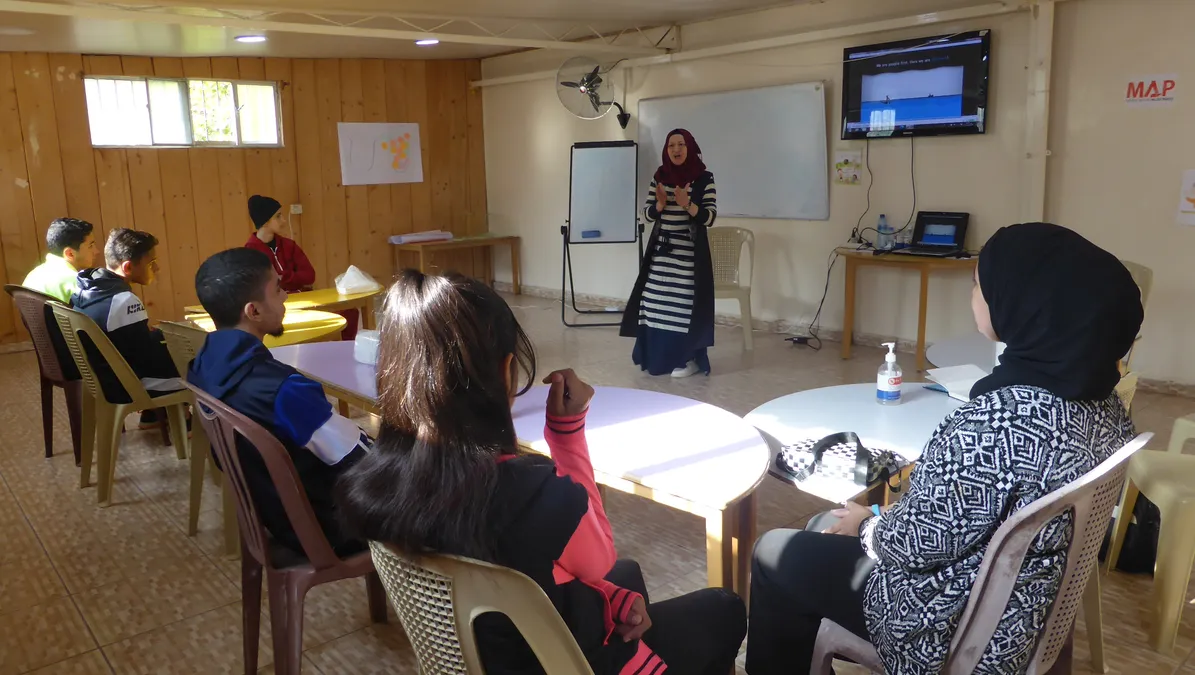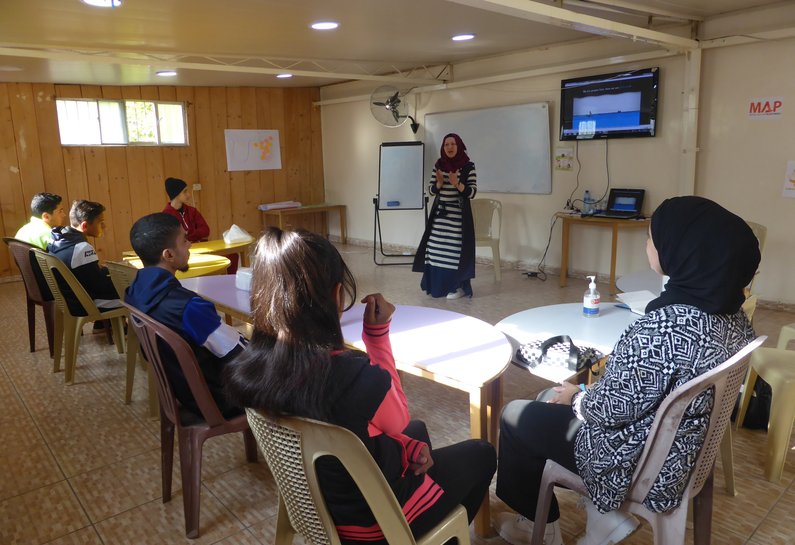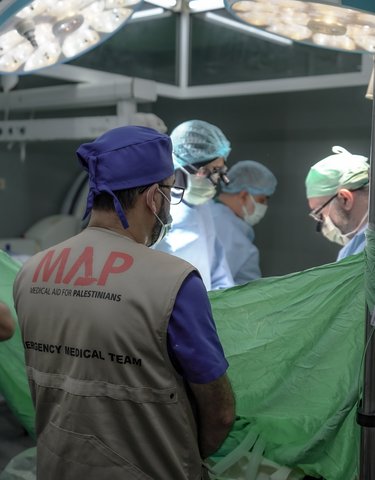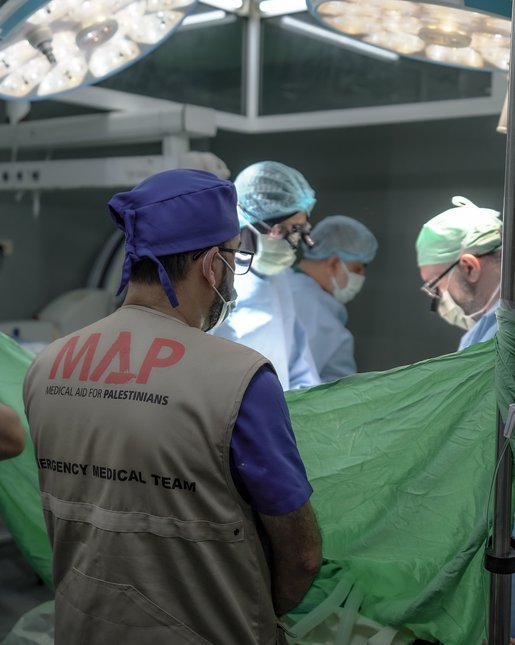Empowering Palestinian children with disabilities to “achieve their full potential”
9 February 2023


17% of Palestinian refugees with disabilities in Lebanon live in the Beddawi and Nahr el Bared refugee camps, in the north of the country, according to the Palestinian Disability Forum. The Community Based Rehabilitation Association (CBRA), Medical Aid for Palestinians (MAP)’s partner in Lebanon, is the only provider of comprehensive services for children with disabilities in these refugee camps. It provides vital rehabilitative services and strengthens support for inclusion of people with disabilities within their communities.
In this interview, CBRA’s Technical Assistant, Manal, spoke to MAP about the situation facing Palestinians with disabilities and the positive impact CBRA is having on children’s lives.
Hi Manal, can you tell us more about yourself and your work with CBRA?
“I have been working for CBRA for around 25 years. I currently work with young people and caregivers of people with disabilities, as well as with schools and vocational training centres, to strengthen awareness of disability issues, and advise on making educational and other environments more accessible and inclusive for children.
My story with disability started from my early childhood. When I started walking, my family noticed something was wrong. I was diagnosed with polio – but only after I fell down the stairs one day and was rushed to the emergency room. I have one leg longer than the other which causes me to have poor balance when I walk.
I am very lucky that I have great parents. They supported me at all stages of my life. I studied in a girls’ primary school where everyone was nice and supportive. I was never bullied at this school, and I didn’t feel that I was different because of my disability. Even though physical movement was not easy for me, I used to run and play with the other children all the time.
My experience at high school was different. It was a mixed school for both boys and girls. At this school, I started understanding that I am different because I was not getting the same attention from my male classmates as the other girls. This used to make me feel bad.
During my last year at high school, I had a bad fall. I was very embarrassed and didn’t want to return to school afterwards. I insisted to go to Russia, where my uncle lived, to seek medical help. In Russia, I saw many doctors and underwent surgery that improved my condition a lot. When I came back to Lebanon, I studied for a diploma in psychology and another in education for children with special needs.
Being a person with a disability, I wanted to work to help children with disabilities and their caregivers as much as possible, and to work with the community to eliminate the prevailing stigma.”
Can you tell us more about what life is like for you as a Palestinian living in a refugee camp in Lebanon?
“I was born in Nahr el Bared Palestinian refugee camp and having been living here ever since. This camp witnessed a major armed conflict in 2007 and it has since become like a military area.” [NB: access is tightly controlled by the Lebanese army unlike most other Palestinian refugee camps].
Life in the camp before the war was much better. The war affected us a lot. You even feel that people have changed. People lost their houses. Many used to live in big houses, while the newly reconstructed houses are very small and there are no spaces for children to play.
People with disabilities face many challenges related to the reconstructed buildings. Most houses have small rooms, there are tall buildings with multiple floors and no lifts in most cases, staircases are very narrow and the possibility of making your home more accessible is very limited.
The socioeconomic crisis in Lebanon has affected everyone in the country but its impact was significant on the camp’s residents. Many people have become extremely poor, and most people are unemployed. This situation contributes to increasing social problems, including drug abuse, particularly among young people.”
How has CBRA’s work impacted your community?
“The main impact has been improving the inclusion of people with disabilities in the community. For example, through the community awareness sessions that we have been conducting for many years, a large proportion of the camp’s residents have become familiar with what disability means, the rights of people with disabilities, and how to include them in society and decision-making.
Over the years, there has been more acceptance of people with disabilities, and people now defend them and advocate for their inclusion and rights. In the past, parents used to deny having children with disabilities and they used to hide them. Now this has changed and parents bring their children to schools, social activities and CBRA’s centre.
We also educate parents and community members on choosing the right terms when talking about disability and people with disabilities, as some words can be harmful. I can still remember all the harmful words that were said to me when I was child.”
Can you describe the issues facing Palestinians with disabilities in Lebanon? What can be done to improve the situation?
“On the positive side, people with disabilities are now able, to a certain extent, to access educational activities; however, their opportunity for employment later is very minimal. This frustrates young people with disabilities and they are not motivated to complete their education because they know no one will employ them. I think UNRWA [the UN agency for Palestinian refugees] should take the primary responsibility in facilitating the education, empowerment, and employment of people with disabilities in order to allow them to be independent and productive.
There is an improvement in inclusion of people with disabilities in schools, especially in north Lebanon which has the highest percentage of inclusion in UNRWA schools. This indicates a decrease in stigma and a better awareness and understanding of disability.
On a social level, many families still do not accept that their son or daughter may marry a person with a disability. Obtaining the needed assistive devices, such as mobility or hearing aid devices, continues to be a problem for poor families [due to their high costs]. Accessibility is not considered in construction planning, so roads and buildings are often not accessible.
Economic empowerment projects and training courses for people with disabilities, to enable them to become financially independent and start their own businesses, could improve their conditions. CBRA was able to support a limited number of young people with disabilities to access vocational training opportunities and later on open small businesses, such as phone maintenance shops or coffee shops. However, the economic crisis in Lebanon badly affected them and they were forced to close down.”
Any last words for MAP and our supporters?
“Your support will allow us to continue to empower people with disabilities and promote their inclusion, independence, and help them achieve their full potential. Thank you.”
Please consider donating to this project and MAP’s other work supporting the rights of people with disabilities in Lebanon and Palestine.
Photo: Manal delivers an educational session for Palestinian children in Lebanon.

